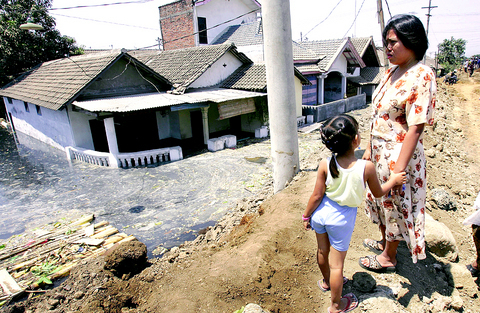Indonesia started dumping mud surging from a gas exploration site in central Indonesia into the sea yesterday, hoping to minimize destruction from the disaster that has submerged entire villages and displaced thousands of people.
The mud flow started after an accident occurred deep in a drilling shaft on the seismically charged island of Java four months ago. It now covers more than 450 hectares and is currently being contained by an ever-expanding network of dams.
The government said earlier it would divert the mud into the sea via a river, despite opposition from environmentalists who protested that the mud was toxic.

PHOTO: AP
National Mudflow Disaster Commission spokesman Rudi Novrianto said yesterday's channeling was considered a trial aimed at eventually dumping the mud into the sea for 20 hours each day at a rate of 18.5m3 per second.
Experts say the mud volcano is one of the largest ever recorded on land.
The mud is believed to come from a reservoir more than 5km underground that has been pressurized by tectonic activity or by the accumulation of hydrocarbon gases.
The gas exploration company blamed for the accident, Lapindo Brantas, argues that seismic activity might have caused the mud to break the surface.
At least 20 factories and many hectares of rice fields and prawn farms have been destroyed. More than 10,000 people have been displaced by the disaster.
The environment minister, who had earlier threatened to block efforts to dispose of the mud in the sea on grounds it might kill fish, said the mud was not toxic and that he now supported the plan.
Local shrimp farmers worried the dumping would ruin their ponds.
"We did not get any compensation from the company or the president for our losses," said Ali Subhan of the local shrimp farmer association.
Meanwhile, a fire raged at the headquarters of Indonesia's state-owned gas and oil company for hours Monday, gutting the top three floors of the Jakarta skyscraper before it was finally extinguished.
No one was injured in the fire that began at 4am and raged for more than seven hours, said Pertamina's spokesman Mohamad Harun, who had no immediate information about the cause.
Thirty-six fire trucks, nearly 200 firefighters and three helicopters were used to fight the blaze, which sent flames and dark plumes of smoke shooting from the 19th, 20th and 21st floors, home to the management offices, officials said.
Minister of State Enterprises Sugiharto said the fire didn't harm any data crucial to Pertamina's business and one analyst said, even if it did, it should not impact Indonesia's import or export operations.
``Pertamina will have back-up data in other locations,'' said Kurtubi, chairman for the Center of Petroleum & Energy Economic Studies.
The chief of Jakarta's fire department, Martono, said the fire apparently started on the 19th floor of the building and then climbed up. It appeared that the fire detection system malfunctioned, he said.

North Korea blew up sections of roads in its own territory that are part of links once used to connect the southern part of the peninsula with the north, in a show of defiance after it accused Seoul of flying drones over Pyongyang. North Korea detonated bombs north of its eastern and western borders at around noon yesterday, South Korea’s Joint Chiefs of Staff (JCS) said. South Korea’s military later fired off warning shots within its border, said the JCS, which also confirmed there were no reports of damage in South Korea from the detonations. A video released by the South Korean

It is usually a serene two-and-a-half-hour ride on Japan’s famously efficient bullet train, but on Saturday, the journey quickly descended into a zombie apocalypse, with passengers screaming in terror. Organizers of the adrenaline-filled trip, less than two weeks before Halloween, touted it as the world’s first haunted house experience on a running Shinkansen. On board one chartered car of the Shinkansen, about 40 thrill-seekers were ready to brave an encounter with the living dead between Tokyo and the western metropolis of Osaka. The eerie experience was inspired by the hit 2016 South Korean action-horror movie Train to Busan, in which a father and

A member of chart-topping K-pop group NewJeans yesterday tearfully testified to South Korean lawmakers as part of an inquiry into workplace harassment, amid a boardroom drama over her super producer. In recent years, South Korea’s K-pop industry has become a global juggernaut powered by the success of groups like BTS, but domestically it is known for imposing strict standards and controls on fledgling stars. Rising K-pop idols are expected to adhere to their powerful agency’s behavior and appearance guidelines, with many stars describing receiving extreme backlash from fans over perceived mistakes in their personal lives, for example dating. Hanni, 20, who is

IRANIAN THREATS: Revolutionary Guards chief Hossein Salami said that it would be a ‘mistake’ for Israel to attack Iran and if it did ‘we will strike you again painfully’ Israel yesterday bombed a Syrian coastal city, while the US conducted multiple strikes on targets in Yemen nearly a month into Israel’s war with Hezbollah in Lebanon. Syria, the Houthi rebels in Yemen, Hezbollah and Hamas in Gaza all belong to the so-called “axis of resistance” led by Iran, which on Oct. 1 conducted a missile strike on Israel. Israel has vowed to retaliate for the strike. Iran’s Revolutionary Guards chief Hossein Salami yesterday said in a speech that Tehran would hit Israel “painfully” if it attacks Iranian targets. “If you make a mistake and attack our targets, whether in the region or in